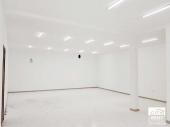|
| Pomorie Bay and the Eastern Balkan range |
|
|
 Crystal clear sea water, endless soft beach lines, unique rock phenomena, sculpted by nature itself over millennia, eco paths, winding across country untouched by human hand or by time, delectable spa procedures, authentic customs and tradition, a myriad temptations for people with a taste for fine wine and local food… It is difficult to describe the panoply of rest and recreation opportunities the Pomorie Bay and the Eastern Balkan range region has to offer.
Crystal clear sea water, endless soft beach lines, unique rock phenomena, sculpted by nature itself over millennia, eco paths, winding across country untouched by human hand or by time, delectable spa procedures, authentic customs and tradition, a myriad temptations for people with a taste for fine wine and local food… It is difficult to describe the panoply of rest and recreation opportunities the Pomorie Bay and the Eastern Balkan range region has to offer.
Designated to attract seaside tourists to the country’s interior, this region incorporates the municipalities of Pomorie, Aitos and Ruen. Pomorie’s three beaches offer all kinds of amusements like water ski, jet ski, water pedaloes, hang gliders. The romantically minded can watch the sun dip into the sea at sunset or enjoy a cruise in the Bay of Pomorie. The combination of sea, sun and curative mud have made the town one of Bulgaria’s foremost spa resorts. The biggest rehabilitation centre in the Balkans and the spa hotels here offer visitors unique therapeutic and relaxation procedures. And all this seasoned with additional attractions at the foot of the Eastern portion of the Balkan range.
“What the guests from abroad visiting these parts enjoy most is the atmosphere of Bulgarian villages, the traditions and the crafts”, says Sonya Enilova, chair of the Bourgas Regional Tourist Association. “One of our main attractions is the lemonade workshop in the authentic Bulgarian village of Kozichino on the ridge of the Eastern Balkan mountain. There, visitors can see the only preserved lemonade-making machine from 200 years ago. Here, tourists can also take a ride in a horse or donkey-drawn carriage or go and see the old wool-combing machine or the still functioning water mill. In Ruen municipality tourists can watch yogurt or white brine cheese as it is made and taste these organic products. The local population, 80 percent of whom are of Turkish origin, have preserved many of their traditions. This means our guests can witness the customs of a different ethnic group that makes part of the country’s population. The rituals connected with different religious feasts are just fascinating, of course invariably accompanied by the temptation of home-made baklava or kadayif. Another attraction not to be missed are the oil-wrestling demonstrations typical of this ethnic group. The fighters smear their bodies with oil and then wrestle – the winner of the bout is called pehlivanin and his reward is a whole lamb.”
Aitos and its environs offer a multitude of extreme tourism opportunities like caving or hang gliding. The only sand speedway in the Balkans is to be found here, near Poroy village. International motocross races are frequently organized here, attracting numerous fans. The ethnographic complex Genger in Aitos itself is a must-see – it is especially popular with tourists from Russia and the Scandinavian countries. Its name is derived from a rare and protected species of plant, endemic to the rocks around Aitos. The word genger comes from Arabic and means thistle. The plant’s root system could reach four meters and protects the rocks from erosion.
“In the very centre of the complex there is an ethnographic house where the lifestyle of a well-to-do merchant from the 19th-20th century has been preserved down to the smallest detail”, says Tanya Angelova, tourist guide at the ethnographic complex. “This house actually existed in a village close to Aitos. Pictures of it were once taken and it was recreated in our day. Visitors can see the authentic furniture, the everyday belongings of the inhabitants as well as the farming tools. Close to this house are the pottery, the copper and the basket-making workshop. Our guests can get a taste of home-baked bread or try to knead and bake some themselves. Here you can find applied art craftsmen, women who crochet Bulgarian lace or make Bulgarian national costumes. The workers at the pottery workshop are heirs to the oldest artisan family in the town, the Orlovs. Everything here is as it once was – the instruments, the hand-working of the clay and the potter’s wheel. The only coppersmith in the region works at the complex. In the studio where he works visitors can try their hand at making souvenirs out of tin or copper.”
At the ethnographic complex’ café visitors can take a cup of fragrant coffee on sand or taste what is known as white jam. And if you are one of the numerous fans of gourmet tourism then the tavern is just the place for you. Here you can feast on tantalizing traditional food made of organic products and seasoned with aromatic local herbs.
There are several wine cellars in the environs of the bay of Pomorie and the Eastern Balkan Range; there you can taste the magical elixir, see the process of wine-making and try some of the high-quality Pomorie wines that have spread the fame of the small town far and wide.
bnr.bg |
| Tuesday, May 20, 2014 |
|
|
|
|
| » RENTALS |

|
|
|
| Shop / Retail |
€ 2 500 |
|
| Location: |
Veliko Tarnovo |
|
|

|